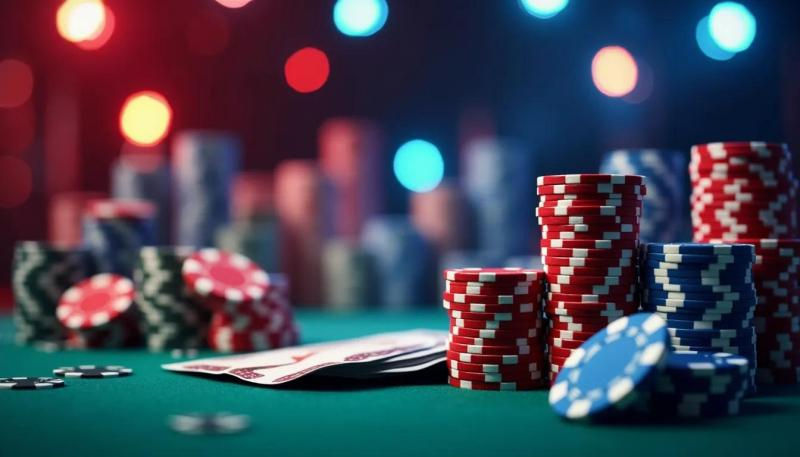Welcome to the high-stakes world of poker events, where skill, strategy, and a touch of luck can lead to fortunes won or lost in the blink of an eye. In this strategic guide, we will delve into the art of mastering the game of poker, from understanding the intricacies of different variations to honing your decision-making skills under pressure. Whether you’re a seasoned pro or a novice looking to sharpen your skills, join us on this journey to elevate your game and outwit your opponents at the poker table.
Planning Your Tournament Schedule: Maximizing Profit and Efficiency
In the world of poker events, strategizing your tournament schedule is key to maximizing profit and efficiency. By carefully planning out which events to participate in and when, you can increase your chances of success and optimize your earning potential. Here are some tips to help you master the art of poker events:
Consider Your Skill Level: When planning your tournament schedule, it’s important to take into account your skill level. Participating in events that are too advanced can result in financial losses and frustration. On the other hand, sticking to events that are too easy won’t challenge you enough to improve your game. Find a balance by entering tournaments that are slightly above your skill level to push yourself to grow and learn.
Diversify Your Portfolio: Just like in investing, diversification is key in poker events. Don’t put all your eggs in one basket by focusing solely on high-stakes tournaments. Mix in some smaller events with lower buy-ins to spread out your risk and increase your chances of cashing in. This strategic approach can help you maintain a steady stream of income while also giving you valuable experience in different types of games and formats.
Track Your Results: To truly master the art of poker events, you need to track your results religiously. Keep a detailed record of your earnings, losses, and other relevant data for each tournament you participate in. This information will help you identify patterns, strengths, and weaknesses in your gameplay, allowing you to make informed decisions about which events to enter in the future. By analyzing your performance over time, you can fine-tune your tournament schedule for maximum profit and efficiency.
Perfecting Your Poker Strategy: Bluffing, Positioning, and Reading Opponents
Bluffing is an essential skill in poker events that can help you deceive your opponents and win big. To master the art of bluffing, you need to be able to read your opponents’ behavior and betting patterns. By carefully observing how they play their hands, you can determine when they are bluffing and when they have a strong hand. Use this information to bluff effectively and keep your opponents guessing.
Positioning is another key element of a successful poker strategy. Your position at the table can greatly impact your decision-making process. When you are in a late position, you have the advantage of seeing how other players act before you. This allows you to make more informed decisions and potentially steal blinds or make profitable plays. On the other hand, being in an early position requires caution and selective play to avoid being outmaneuvered.
Reading your opponents is a crucial skill that can give you a significant edge in poker events. Pay attention to their body language, facial expressions, and betting habits to gather information about the strength of their hand. Look for patterns and tendencies that can help you predict their next move. By staying focused and observant, you can outsmart your opponents and make strategic decisions that lead to victory.
Building and Maintaining Your Bankroll: Budgeting and Risk Management
In the world of poker events, mastering the art of building and maintaining your bankroll is crucial for long-term success. Budgeting and risk management are key components that can make or break your poker career. By following strategic guidelines, you can ensure that your bankroll remains healthy and allows you to thrive in the competitive poker landscape.
Budgeting Techniques:
- Create a budget that includes your expenses outside of poker.
- Allocate a portion of your bankroll for buy-ins and expenses related to poker events.
- Stick to your budget and avoid chasing losses by playing above your limits.
Risk Management Strategies:
- Implement proper bankroll management by only risking a small percentage of your total bankroll on each event.
- Understand the variance in poker and be prepared for both upswings and downswings.
- Avoid going on tilt by staying focused and disciplined, even during tough sessions.
When approaching poker events, remember that success is not just about winning big hands or tournaments, but also about smart decision-making and calculated risk-taking. By mastering budgeting and risk management, you can set yourself up for long-term profitability and sustainability in the competitive world of poker events.
Staying Sharp and Focused: Mental Preparation and Physical Endurance
To excel in the world of poker events requires more than just luck and skill. It demands a combination of mental preparation and physical endurance. One must be able to stay sharp and focused throughout the entire duration of the event, no matter the challenges that may arise.
Mental Preparation:
- Practice mindfulness techniques to stay calm under pressure.
- Visualize your goals and strategies before entering the event.
- Develop a positive mindset to handle wins and losses gracefully.
Physical Endurance:
- Stay hydrated and nourished to maintain energy levels.
- Incorporate regular exercise into your routine to increase stamina.
- Take short breaks to rest and recharge your mind and body.
Networking and Improving: Collaborating with Other Players and Seeking Feedback
In the world of poker events, networking and collaborating with other players can be a game-changer. By building relationships with fellow enthusiasts, you not only expand your knowledge base but also open doors to new opportunities. Whether it’s sharing strategies, discussing hand histories, or simply engaging in friendly banter, connecting with others in the poker community can help you level up your game.
Seeking feedback is another essential aspect of mastering the art of poker events. Constructive criticism from peers can provide valuable insights into your gameplay and help you identify areas for improvement. Embrace feedback as a learning opportunity, rather than a critique, and use it to fine-tune your skills and hone your strategy. Remember, the best players are always seeking ways to grow and evolve their game.
Incorporating networking and feedback into your poker event experience requires a proactive approach. Attend tournaments, join online forums, and participate in study groups to connect with like-minded individuals. Be open to different perspectives and be willing to adapt your approach based on feedback received. By collaborating with others and seeking feedback, you can enhance your skills, build a supportive network, and ultimately increase your chances of success at the poker table.
Q&A
Q: What are some key strategies for success in poker events?
A: In poker events, it is crucial to have a solid understanding of the game’s rules and strategies. Additionally, mastering the art of reading your opponents and knowing when to bluff are essential skills for success.
Q: How can players improve their poker skills?
A: Players can improve their poker skills by studying the game, analyzing their own gameplay, and learning from experienced players. Practice, patience, and dedication are key to mastering the art of poker events.
Q: What are some common mistakes to avoid in poker events?
A: Common mistakes to avoid in poker events include playing too many hands, being overly aggressive, and not paying attention to your opponents’ tendencies. It’s important to stay focused, make calculated decisions, and adapt your strategy based on the dynamics of the game.
Q: How can players maintain their mental focus during poker events?
A: To maintain mental focus during poker events, players should take breaks when needed, stay hydrated, and avoid distractions. It’s also important to practice mindfulness and stay calm under pressure to make rational decisions at the table.
Q: What role does luck play in poker events?
A: Although luck plays a significant role in poker events, skill and strategy are ultimately what determine long-term success. While luck may influence individual outcomes, skilled players consistently outperform their opponents through calculated decisions and strategic gameplay.
The Way Forward
As you embark on your journey to master the art of poker events, remember that strategy, patience, and skilled decision-making are your greatest allies. By honing your skills and studying the game diligently, you can elevate your playing to new heights and achieve success in the high-stakes world of poker tournaments. So, gather your chips, trust your instincts, and may the cards be ever in your favor as you strive to conquer the poker table and emerge victorious in every hand you play. Good luck!








